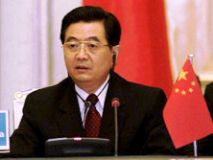Sudan at tops agenda of Chinese president in African tour
Jan 27, 2007 (BEIJING) — Twice in the past three years, Chinese President Hu Jintao has been greeted warmly in Africa as the leader of a growing economic and political power. But on his new trip, Hu faces bumpier going, with skepticism growing about China’s role in Africa.
 The itinerary for the eight-nation, 12-day tour which starts Tuesday demonstrates both the scope and the pitfalls of China’s influence. Included are stalwart allies like South Africa and Zambia — but both places where protests and criticisms about Chinese motives have arisen recently — to new friends like Liberia, where China is hunting for oil and supplying peacekeepers.
The itinerary for the eight-nation, 12-day tour which starts Tuesday demonstrates both the scope and the pitfalls of China’s influence. Included are stalwart allies like South Africa and Zambia — but both places where protests and criticisms about Chinese motives have arisen recently — to new friends like Liberia, where China is hunting for oil and supplying peacekeepers.
No stop illustrates the challenges as starkly as Sudan. In recent weeks, Hu has come under pressure from the United States and new U.N. Secretary-General Ban Ki-Moon to use China’s leverage as a big customer for Sudanese oil to get Khartoum to resolve the crisis in the Darfur region, where civil strife has left 180,000 dead and displaced 2 million people.
Beijing has raised expectations that it is heeding the message, calling on Sudan to cooperate with the United Nations in finding a solution.
Chinese leaders are “going to have to make a decision about this,” said Lawrence Rossin of the U.S.-based Save Darfur Coalition. “Either their quiet diplomacy is working … or they’re going to have to realize that (Sudanese President Omar al-Bashir is) stiffing them, too. And I don’t think a country like China should take ‘no’ for an answer.”
The expectations swirling around Hu’s trip further punctuate China’s arrival as a force in Africa, rivaling the European colonial powers that once held sway.
Trade between China and Africa has soared fourfold this decade, to US$40 billion (€33 billion) in 2005. Beijing has become a major supplier of aid, last year announcing US$10 billion (€7.9 billion) in assistance from 2006 to 2009.
Hu’s trip_which also includes visits to Cameroon, Namibia, Mozambique and Seychelles_will focus on further boosting trade and following through on the promises of aid, including debt-relief and moves to alleviate poverty.
Hu’s itinerary is a “mixed bag of countries small, medium and large,” seemingly designed to de-emphasize China’s thirst for oil and play up its wider interests, said Sanusha Naidu, a researcher in Chinese studies at South Africa’s University of Stellenbosch.
While China’s trade with South Africa, one of Africa’s biggest markets, last year hit US$8.8 billion and trade with oil-rich Sudan was US$2.9 billion, countries like the Seychelles and Mozambique have little to offer Beijing beyond prawns and cashews, Naidu said.
But the gesture will garner good will with Africans, she said. “I can’t remember the last time (U.S. President George W.) Bush visited,” Naidu said.
China offers African countries a “countervailing force to U.S. hegemony,” offering aid with fewer strings attached, said Francis Kornegay, an analyst at the Center for Policy Studies in Johannesburg.
Yet China’s support does come with conditions, including a ban on formal ties with rival Taiwan and expectations that recipients vote with China at the United Nations. This month, South Africa joined Beijing in voting against a resolution to censure Myanmar for human rights abuses, arousing criticism that South Africa had forgotten the U.N.’s help in abolishing apartheid.
As China sinks roots deeper in Africa, disputes are sprouting. In Zambia, a Cold War era ally and a key supplier of copper, miners have protested abusive conditions at a Chinese-owned mine, and China became an issue in last year’s presidential election.
Last month in South Africa, where trade unions have complained that Chinese textile imports were devastating domestic industry, President Thabo Mbeki pointedly told a student audience that Africa needed to guard against allowing relations with China to develop into a “colonial relationship.”
Mbeki’s reference was to the Western colonial powers — who are accused of taking the continent’s natural resources while doing little to improve Africans’ lives.
Though Mbeki quickly added that he thought Beijing’s leaders wanted to avoid the colonial pattern, his comments resonated with some, receiving wide attention in the South African press.
China has taken notice. Chinese Assistant Foreign Minister Zhai Jun told reporters last week that Beijing wanted its businesses in Africa to be more responsible. He said some Chinese businessmen were still “inexperienced when it came to doing business abroad.”
Zhai said Mbeki’s comments were an “understandable” warning about a possible future scenario, not the current reality of China-African ties. He said Hu would likely address concerns about colonial-style engagement during his visit.
“He ought to,” Zhai said.
(AP)
